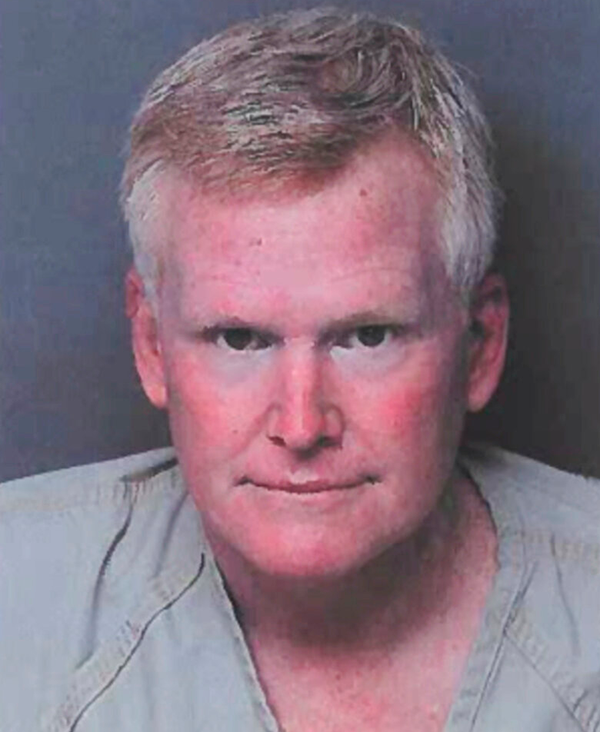Weekly Briefs: New charges against lawyer accused of staging his shooting; Christian florist settles

Alex Murdaugh. Photo from the Hampton County Detention Center via the Associated Press.
Suspended lawyer Alex Murdaugh faces new charges
Suspended South Carolina lawyer Alex Murdaugh, previously charged in an alleged scheme to have himself killed for insurance money, is facing 27 new charges as the result of five indictments by a South Carolina state grand jury. The indictments allege that Murdaugh stole $4.8 million from law clients and his law firm, PMPED, a shortened version of Peters, Murdaugh, Parker, Eltzroth and Detrick. Murdaugh allegedly laundered the money by depositing it in an account that he called “Forge.” The name is similar to that of a legitimate structured settlement company, Forge Consulting. Among the alleged financial victims are the family of his late housekeeper, who died in what Murdaugh said was a fall at his home. The new charges include breach of trust with fraudulent intent, money laundering, computer crimes and forgery. (Reuters, the State, the Island Packet, South Carolina attorney general press release)
Settlement reached in Arlene’s Flowers case
A Christian florist has agreed to withdraw a petition for rehearing before the U.S. Supreme Court in a dispute over her refusal to provide flowers for a same-sex couple’s wedding. The florist, who owns Arlene’s Flowers, will also pay $5,000 to the couple, who will donate the money to an LGBTQ rights organization. The settlement leaves in place two Washington Supreme Court decisions against the florist, who had asserted that her religious beliefs gave her a First Amendment right to refuse service. (American Civil Liberties Union press release, Law360, the Volokh Conspiracy)
$100K winner of law firm jingle contest announced
Mitchell Graham Hines of Apopka, Florida, has won $100,000 in a contest to produce the best jingle for the personal injury firm Morgan & Morgan. Hines’ song ends with five notes on the xylophone that “could be the real trademark to our jingle,” said lawyer John Morgan. Hines, who works at Duffy’s Sports Grill in Altamonte Springs, Florida, said the first thing he plans to do is to pay off his credit card. (The winning song, Reuters, the Tampa Bay Times, the Orlando Sentinel)
Proposed changes announced for DOE’s civil rights data collection
The U.S. Department of Education’s Office for Civil Rights on Thursday announced plans to add a category about nonbinary people to its data collecting for public schools. Also, the agency plans to include COVID-19-related queries to its data collecting and make revisions to guidance on the definition of restraint and seclusion, according to a news release. There are also plans to restore and expand data collection regarding preschool students with disabilities and those who are English learners. All revisions have been submitted to the Federal Register for public comment. (U.S. Department of Education announcement)
Alex Jones loses another suit over Sandy Hook claims
Once again, a judge has entered a default judgment against Infowars host and conspiracy theorist Alex Jones in a defamation lawsuit filed over his claims that the mass shooting at the Sandy Hook Elementary School in Newtown, Connecticut, was a hoax. Judge Barbara N. Bellis, ruling in a case by the families of eight Sandy Hook victims, found that Jones was liable because he failed to turn over documents in the case. Jones was also found liable by default in a Texas case. (The New York Times)
Juvenile lifer who won SCOTUS case is released
A 75-year-old Louisiana inmate whose case led to an important U.S. Supreme Court ruling has been released on parole after serving 57 years in prison for the murder of a sheriff’s deputy. The inmate, Henry Montgomery, was the named petitioner in Montgomery v. Louisiana, a 2016 Supreme Court decision that gave retroactive effect to a prior decision barring mandatory life in prison without parole for juveniles. (The Associated Press, the Advocate via How Appealing)
Judge blocks New York Times from publishing documents
A New York judge on Thursday temporarily blocked the New York Times from publishing privileged attorney-client information involving the activist group Project Veritas, which conducts sting operations with the aim of exposing liberal bias. Judge Charles Wood’s order remains in place until a hearing next week on whether to require the New York Times to bar all references to the privileged materials. The New York Times had briefly posted links to the documents prepared by a Project Veritas lawyer, who explained ways to pursue undercover reporting without breaking the law. The Times says the posting was inadvertent. The New York Times is seeking “an immediate review” of the decision. (The New York Times, BuzzFeed News, Wood’s order)
Write a letter to the editor, share a story tip or update, or report an error.


